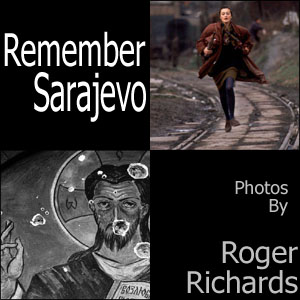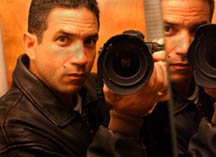
January 2003 Do
we need to remember Sarajevo? The war in Bosnia ended in 1995, and much
has happened since then, not only in Bosnia, but in the rest of the
world. We have lived through the events of 9/11, we have engaged in
war in Afghanistan, and we are on the verge of another war in Iraq.
We are being told that America’s survival is at stake, and though
we may doubt the severity of the threat, or the wisdom of the government’s
response to it, there are people who wish fatal harm to America.
Sarajevo, and the agony it suffered in the 1990s, would seem to carry little importance today. It is just a scarred Balkan city filled with aid workers, peacekeepers and a population that sadly remembers its history even as others forget it. Bosnia is not in material breach of anything today. Sarajevo is fading away, filed in the recesses of our historical memory between the tragedies of Somalia and Rwanda, which briefly grabbed our attention before they faded away, too. Yet Sarajevo was besieged not just by men with weapons but by evil. It was a multicultural city set upon by nationalists who engaged in ethnic cleansing on a scale not seen in Europe since World War II. In the past year or two, the phrase “ethnic cleansing” has retreated from the lexicon of national discourse, replaced by the new catchphrases of our fears, such as Al Qaeda and weapons of mass destruction and Osama bin Laden. Even so, the evil of ethnic cleansing must be recalled, alongside the shameful fact that America and its allies tolerated mass murder because it did not seem to threaten us. When, finally, it did menace our interests—the NATO alliance was beginning to unravel over the morass of Bosnia—a U.S.-led bombing campaign began, and the Serb nationalists who started the war were forced to end it, but awarded nearly half the country as a sweetener. Sarajevo teaches us that we must be prepared to act even if a force of evil does not directly threaten our homeland. It is possible for genocide to occur almost anywhere on Earth and for life to continue in New York and Washington without a ruffle of concern or dislocation. Sarajevo is proof that our indifference can kill. It doesn’t kill us, but those upon whom we allow evil to have its way. Even if it doesn’t imperil our territory or the price of gasoline, we are diminished by its triumph, and a world in which such triumphs occur is not a safe world. Roger Richards was among the many journalists who worked in Bosnia during the war, and he continued to work there after the country was carved up under the Dayton peace treaty. His evocative photographs take us back to that time, as do the accompanying remembrances from Sarajevans who provide a pitch-perfect narrative to his stark and damning pictures. This combination of pictures and words is powerful. “Remember Sarajevo” makes us do just that, and for that reason, it merits a wide audience. "These photographs were made with the intent of making the world look at an evil that was taking place before their eyes, and to force it to face unpleasant truths,” Richards says. “We journalists kept doing our jobs, to the point where we became resented by the citizens of Sarajevo as voyeurs. But the fact that we kept on making these images of horror eventually led to a time when the world could avert its eyes no longer. I consider myself to be a caretaker of historical documents and with it comes the responsibility to remind my fellow humans of what can happen when evil is allowed to flourish without challenge from the good." Evil recedes rather than dies. It is persistent. We must not avert our gaze when it begins to draw the blood of innocent people stricken by the machetes and bullets of genocide. The photos and text in this exhibition explain, elegantly and painfully, why that is so. Sarajevo. Remember. © 2003 Peter Maass |
||
Enter
Roger Richard's: Remember Sarajevo
View
Roger Richards' Short Film: Seven Lillies
|
Write a Letter
to the Editor |
